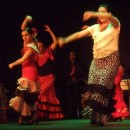5 Poets in Artemis
Artemis is a showcase for women poets, reviewers and artists. It is published by Second Light Publications as a 60 pp + magazine twice a year, and especially features older poets who have been writing for years without proper recognition. The reviews in particular provide a handy round-up of who’s doing what on the UK poetry publishing scene. I have chosen five poems to illustrate the work available on line by courtesy of the London South Bank’s Poetry Library. Many are winners or runners-up in competitions. To start on a light-hearted note, Caroline Carver’s If you are stolen, call police (http://www.poetrymagazines.org.uk/magazine/record.asp?id=25960) puts together a list of delightful warnings from those whose first language isn’t English. It starts: The sea is dangerous Please don’t swim Once happen any accident At his own risk If going out hold walking lane always...
Read More5 Poets in Acumen
Acumen was started in 1985 by Patricia Oxley and is now a fat (120 page) production appearing three times a year, with articles, reviews, translations, but mostly poetry. Each issue contains around 50 poems, and the style is mainstream with an emphasis on what might be called an intelligent use of craft. Many contributors are well known on the UK poetry scene, but new poets are also found a place. Only three issues are currently online via the Poetry Library on London’s Southbank (issues 39, 46 and 50) and it is from issue 50 (September 2004) that I’ve selected five pieces for brief review. The pieces largely speak for themselves: I’ll just note the features that seem specially worthy of comment. Ghazal by Mimi Khalvati can be read at: http://www.poetrymagazines.org.uk/magazine/record.asp?id=21608 The aa etc. xa ya za aa rhyme scheme...
Read MoreVersions of Horace 3
This is the third and concluding post comparing translations of Horace Odes. Carmen One 28 Measure: First Archilochean: – u u – u u – / u u – u u – u u – x – u u – u u – u u – x Theme: Death comes to all. Latin and word-for-word translation: Te maris et terrae numeroque carentis harenae mensorem cohibent, Archyta, pulueris exigui prope latum parua Matinum munera nec quicquam tibi prodest aerias temptasse domos animoque rotundum percurrisse polum morituro. Occidit et Pelopis genitor, conuiua deorum, Tithonusque remotus in auras You, sea and earth and numberless sand surveyor confines you, Archytas, small dust near unimportant shore of Matinium offer nor are you worth round sky home and spirit scan sky you will die. Died and Pelop’s father, guest of gods Tithonus drawn into air...
Read MoreVersions of Horace 2
This is the second post comparing translations of Horace odes, and here we look at Book One Carmen 5. It’s in the Fourth Asclepiadean, which runs: – – – u u – / – u u – u x – – – u u – / – u u – u x – – – u u – x – – – u u – u – The third line pulls the movement up short, often giving it emphasis or special focus. The Latin and word-for-word translation are: Quis multa gracilis te puer in rosa perfusus liquidis urget odoribus grato, Pyrrha, sub antro? cui flauam religas comam, simplex munditiis? Heu quotiens fidem 5 mutatosque deos flebit et aspera nigris aequora uentis emirabitur insolens, Who much slender you boy on rose bathing liquid squeezing with scent pleasing, Pyrrha, under cave...
Read MoreVersions of Horace 1
I was once asked if it could be ‘fair’ to look at other translations before beginning one’s own work. Not only fair, was my reply, but essential, and not simply to glance at previous versions but study them carefully. Translation is not a competition, but a fraternity of interests where each practitioner learns from others, as happens in all the sensible professions. Originality can be overdone, and in a world awash with translations what is often needed is a wise eclecticism that recasts previous attempts in the crucible of imagination and proper understanding of poet and period. Many authors are now adequately translated, and further efforts, unless they most significantly improve on their forebears, are a waste of everyone’s time. 1. OVERVIEW The qualities that make the Odes of Horace worth attention are by their nature difficult to translate...
Read MoreAmiri Baraka
In 2002, a year after 9/11, the black American poet and activist Amiri Baraka read a long poem apparently criticizing America and including questions about the Israeli intelligence warning of an impending attack on the twin towers. (1) It was in his usual no-holds-barred, in-your-face style, (2) and the poet was writing from an establishment position as the poet laureate of New Jersey. The response was loud and predictable. The Jewish community accused him of anti-Semitism, and demanded his resignation. (4) The mainstream press demonized him as anti-American. (3) The literary world distanced itself from his views, but pleaded for artistic freedom. (5) No one pointed to the obvious, that firstly the poem came close to crude pamphleteering and, secondly, there was nonetheless a pressing need for a sustained, detailed and transparent investigation into the 9/11 material that Amiri...
Read More




